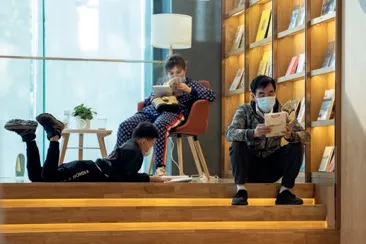ROMANTIC REALISM
2022-05-25HowhasCOVID19alteredthebookshoplandscapeByLiQing
How has COVID-19 altered the bookshop landscape? By Li Qing
Video may have killed the radio star, but it appears no virus can kill the bookstore.
“Since the pandemic first broke out, not one positive case has been found in a bookshop. This line has become popular among China’s literature-loving netizens,” Wang Lei said. In 2018, he founded Beijingbased chain Leiter which includes more than 20 shops around the Chinese capital.
We never could have imagined the pandemic would last this long,he told. Leiter’s overall foot traffic has declined by 80 percent from pre-pandemic levels. But it’s not just a problem facing this chain; it’s an industrywide issue.
“This is probably the biggest blow we’ve ever been dealt, and shops in the industry are diversifying in order to cope with the situation,” Wang said.
Caught in a bind
Physical bookshops started looking for new distribution channels some 10 to 15 years ago, when the Internet had become ubiquitous and e-commerce was carving out a buzzworthy business reputation for itself.
The fierce competition between online and brick-and-mortar stores forced the latter, once reliant on social gatherings, to expand their business online. This strategy once again came to their rescue when COVID-19 forced many to close their doors.

Wang Lei, founder of the Leiter bookstore chain in Beijing
In February 2020, shortly after the novel coronavirus was first reported, Shanghai’s Zhongshuge Bookstore became the first to stream itself on Taobao Live, introducing and selling books, as well as promoting itself. This first attempt attracted nearly 9,000 people in four hours and gained 27,000 likes.
Beijing’s Yanjiyou Bookstore, hailed worldwide for its visually stunning offline experience, became the first of its kind to serve food, stationary and other products via online food delivery platforms in China’s capital. Another 72 bookshops followed in its digital footsteps that same month.
Wang explained online activities are an important way to keep business afloat as most people have reduced their outdoor activity. “The pandemic is a perfect opportunity for them to rediscover that opening a book is the cheapest and best way to calm down when the daily reality is filled with anxiety,” he said.
That need to reach out also drives his stores to host more activities at the community level.For example, Leiter unveiled its first batch of 24-hour vending machines in Beijing, which recently went into operation.Each machine holds nearly 400 books—physical ones. “Sterilized regularly, those machines can help consumers avoid gatherings and physical contact, crowds in line with COVID-19 prevention and control requirements,” he said.
This virus cannot kill the bookstore, but it can accelerate transformation and growth, He Qicong, associate professor with the Beijing Institute of Culture Innovation and Communication at Beijing Normal University, wrote in an article published in Beijingbased.
On the same page
One thing is clear, what the industry needs right now is confidence,Wang said, adding that that sense of confidence must come from the government.

People read at a book shop in Nanjing, Jiangsu Province, on May 2
Since 2016, while 11 central government agencies have jointly issued a document supporting bookshops across China, local governments have designed multiple preferential policies. For example,Beijing has been granting financial subsidies to offline bookshops for five consecutive years at this point. Shanghai constructed a procurement platform to support the participation of these stores in public cultural services. Chengdu in Sichuan Province then issued coupons to encourage people to buy books.
“Support is also what we need,”Wang said. One of his bookstores,in Beijing’s Dongcheng District,accepted three subsidies covering rent, store promotion and the organizing of cultural activities in 2021.
The government did not leave this hard-hit industry out in the cold. Tax breaks and other preferential measures have been applied in different regions.
What’s more, and perhaps to the pleasant surprise of many, a report on China’s physical bookshop industry released by the Books and Periodicals Distribution Association of China in 2021 shows that 2020 saw the birth of over 4,000 stores,2.5 times the number of stores that were shut down.
“The data demonstrate the industry’s positive attitude,” Wang added. He thinks literature, which in his words “has the power to heal souls,” will take up a more important social role once the pandemic subsides.
“But the industry does require the participation of government and society to improve stores’ ability to evolve in sustainable manner.”
The eye has to travel
Wang divided bookshops into three categories.“The Xinhua stores make up the first group; they are the bellwether of the industry here.” As the largest chain in China, Xinhua is the only brand that carries thousands of outlets across the nation.The chain’s influence has waned in recent years as private bookshops have begun to flourish.
The second category, represented by Leiter, attaches great importance to technology, culture and innovative operating models. But what Wang really admires is group number three: these outlets come with a massive online influence which can be turned into foot traffic.
Yet it does seem that for the third category, looks matter more than books. And how they can convert online traffic into reader connections supersedes their drive to become a reputable shop.
As a traditional brand, Xinhua features literature on almost all subjects, and people will usually find something to their taste, Deng Ting, executive planning director of a Xinhua Winshare bookstore in Chengdu, Sichuan Province, told Chengdu.com.For that reason, it cannot blindly follow decorative fads or operating trends. But it has included some little “luxuries” like coffee and more nicely equipped reading areas.
Leiter focuses on the “community feel” and its Beijing stores all follow the same concept: building studies in the city. Wang used to operate a public cultural company.That experience helps him better explore the significance and functions of a bookshop.
“Serving society and promoting culture are our responsibilities.Although they sometimes are non-profit, we should not crudely consider our business a solely commercial undertaking.”
For example, the Leiter store in Dongcheng District has teamed up with the district library. “We contribute part of our store and services to ensure residents read and borrow books,” Wang explained.He also highlighted the library’s rich resources, such as inviting experts from different fields to give lectures.
“Buying a book is not the only purpose when people enter my stores. With a pleasant environment and high quality service, they can exchange thoughts developed through reading. I want to provide a channel for social activities and a new lifestyle,” he said.
In the documentary, the title based on a poem by Polish-American poet Czeslaw Milosz, bookshop founders are called romantic heroes. Romantic yet realistic. “Ours is a challenging undertaking but seeing people read at my stores truly does bring me a sense of fulfillment,” Wang said. BR
